Avoid getting scammed by sites claiming that your iPhone has been locked
Mac VirusAlso Known As: "iPhone has been locked" virus
Get free scan and check if your device is infected.
Remove it nowTo use full-featured product, you have to purchase a license for Combo Cleaner. Seven days free trial available. Combo Cleaner is owned and operated by RCS LT, the parent company of PCRisk.com.
What is iPhone Has Been Locked?
"iPhone Has Been Locked" is a fake error message displayed by various malicious sites. It is very similar to to Your Mac Is Infected With 3 Viruses, Please Call Apple Support, and many others.
Research shows that users typically visit deceptive sites inadvertently - they are redirect by intrusive advertisements (delivered by other rogue sites) or potentially unwanted programs (PUPs), which infiltrate systems without permission. Most PUPs are also designed to record user-system information and deliver intrusive advertisements.
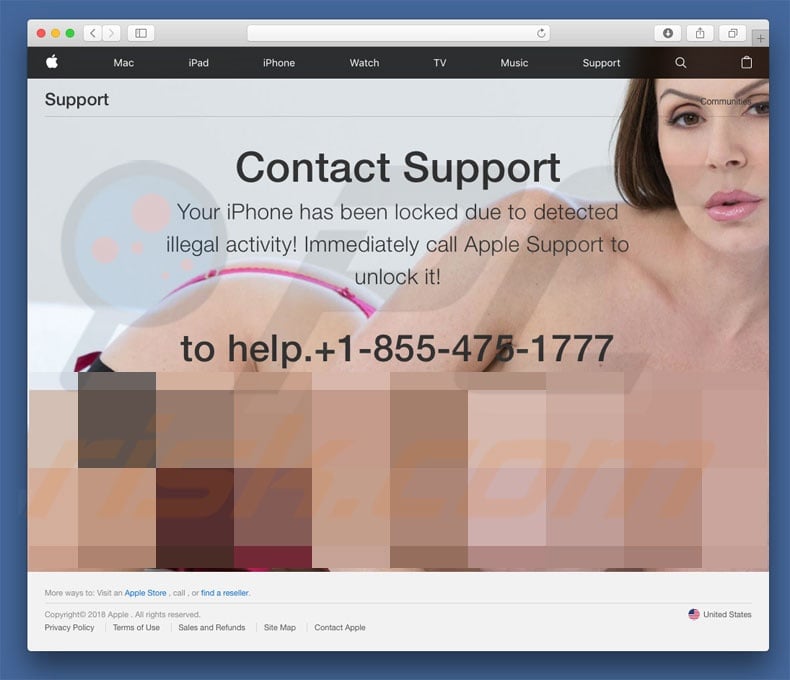
iPhone Has Been Locked scam overview
"iPhone Has Been Locked" states that users' iPhones are locked due to 'illegal activity' and encourages them to immediately contact Apple's tech support via a telephone number ("+1-855-475-1777") provided. They then supposedly receive instructions about how to resolve the issue. Be aware, however, that this is a scam - your device is probably secure.
Cyber criminals generate revenue by scaring and tricking unsuspecting users into calling fake 'tech support' and paying for services that are not required. It is worth noting that "iPhone Has Been Locked" has a rather unique feature which is not common for other tech scams.
The malicious website is designed to launch a default calling application (e.g., FaceTime) and automatically call the aforementioned number. By doing so, crooks significantly increase the chance of scamming - shocked user is way more likely to click "Call" instead of "Decline".
Either way, ignore the "iPhone Has Been Locked" error and immediately leave these sites. Note that some rogue sites employ scripts that prevent users from closing browsing tabs/windows. In this case, simply terminate the web browser using Activity Monitor or reboot the system.
After re-running the browser, do not restore the previous session, otherwise you will return to the malicious site.
IMPORTANT NOTE! If you encounter this error using a mobile device, you should follow these instructions:
- Click on "Home" button and swipe Safari upwards
- Go to: Settings -> Safari
- Clear History and Website Data
If you see the "iPhone Has Been Locked" error when using a computer, simply follow the adware removal instructions below.
Potentially unwanted programs record various user-system information relating to browsing activity. Collected data (IP addresses, website URLs visited, pages viewed, search queries, etc.) usually includes personal details that developers share with third parties (potentially, cyber criminals). These people misuse private information to generate revenue.
Therefore, the presence of information-tracking apps might lead to serious privacy issues or even identity theft. PUPs deliver coupon, banner, pop-up, and other similar intrusive advertisements. To achieve this, developers employ various tools (e.g., "virtual layer") that enable placement of third party graphical content on any site.
Therefore, intrusive ads often conceal underlying content, thereby significantly diminishing the browsing experience. In addition, displayed ads often redirect to malicious websites and even execute scripts that stealthily download and install other PUPs (or even malware).
Therefore, even a single accidental click can lead to various computer infections. For these reasons, you are strongly advised to eliminate all potentially unwanted programs immediately.
| Name | "iPhone has been locked" virus |
| Threat Type | Phishing, Scam, Mac malware, Mac virus |
| Tech Support Scammer Phone Number | +1-855-475-1777; +1(804)-666-0213; +1(831)-498-2611, +1(877)-313-5373, +1(888)-393-5303 |
| Related Domains | applecareonline[.]com |
| Symptoms | Fake error messages, fake system warnings, pop-up errors, hoax computer scan. |
| Distribution methods | Compromised websites, rogue online pop-up ads, potentially unwanted applications. |
| Damage | Loss of sensitive private information, monetary loss, identity theft, possible malware infections. |
| Malware Removal (Windows) |
To eliminate possible malware infections, scan your computer with legitimate antivirus software. Our security researchers recommend using Combo Cleaner. Download Combo CleanerTo use full-featured product, you have to purchase a license for Combo Cleaner. 7 days free trial available. Combo Cleaner is owned and operated by RCS LT, the parent company of PCRisk.com. |
As mentioned above, "iPhone Has Been Locked" shares many similarities with dozens of other fake errors. All claim that the system is damaged, however, these errors are designed only to extort money from unsuspecting users. Potentially unwanted programs also share many similarities.
By offering a wide range of "useful features", they attempt to give the impression of legitimacy, however, the only purpose of all PUPs is to generate revenue for the developers.
Rather than giving any real value for regular users, they cause unwanted redirects, deliver intrusive ads, and gather sensitive information, thereby posing a direct threat to your privacy and Internet browsing safety.
How did potentially unwanted programs install on my computer?
Some PUPs have official download/installation websites, however, most are distributed using intrusive advertisements and a deceptive marketing method called "bundling" (stealth installation of third party apps together with regular software/apps).
Developers do not properly disclose PUP installations - they are hidden within "Custom/Advanced" settings (or other sections) of the download/installation processes. Many users are likely to click various advertisements and skip download/installation steps - behavior that often leads to inadvertent installation of PUPs.
In this way, they expose their systems to risk of various infections and compromise their privacy.
How to avoid installation of potentially unwanted applications?
To prevent this situation, be very cautious when browsing the Internet and downloading/installing software.
Intrusive advertisements typically seem legitimate, since developers invest many resources into their design, however, most redirect to dubious websites (gambling, pornography, etc.) If you experience these redirects, immediately eliminate all dubious applications and browser plug-ins.
Furthermore, select "Custom/Advanced" settings and closely analyze each step of the download/installation processes. Opt-out of all additionally-included programs and decline offers to download/install them. You are advised to download your apps from official sources only, using direct download links.
Third party download/installation tools are monetized by promoting PUPs, and thus should never be used. The key to computer safety is caution. If your computer is already infected with PUPs, we recommend running a scan with Combo Cleaner Antivirus for Windows to automatically eliminate them.
Text presented in "iPhone Has Been Locked" pop-up scam:
Contact Support
Your iPhone has been locked due to detected illegal activity! Immediately call Apple Support to unlock it!
To help. +1-855-475-1777
"iPhone Has Been Locked" scam attempting to initiate a phone call:
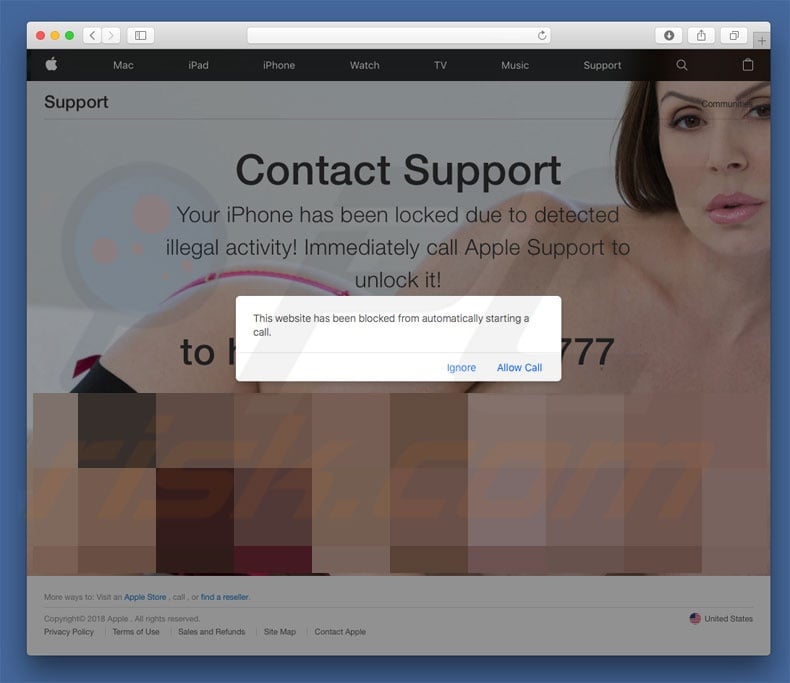
Another website delivering "iPhone Has Been Locked" scam message:
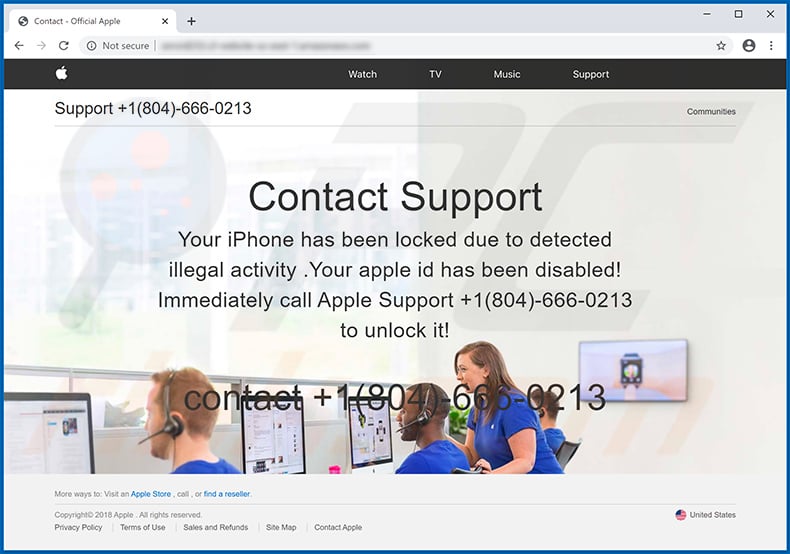
Text presented within:
Support +1(804)-666-0213
Communities
Contact Support
Your iPhone has been locked due to detected illegal activity .Your apple id has been disabled! Immediately call Apple Support +1(804)-666-0213 to unlock it!contact +1(804)-666-0213
More ways to: Visit an Apple Store , call , or find a reseller.
United States
Copyright© 2018 Apple . All rights reserved.
Privacy Policy Terms of Use Sales and Refunds Site Map Contact Apple
Appearance of this "iPhone Has Been Locked" scam variant delivered using Amazon AWS service (GIF):
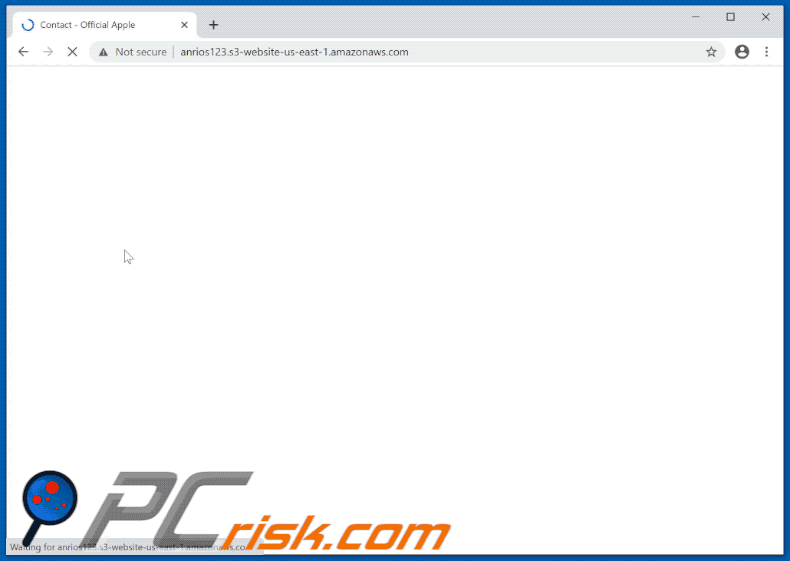
Yet another variant of "iPhone Has Been Locked" pop-up scam:
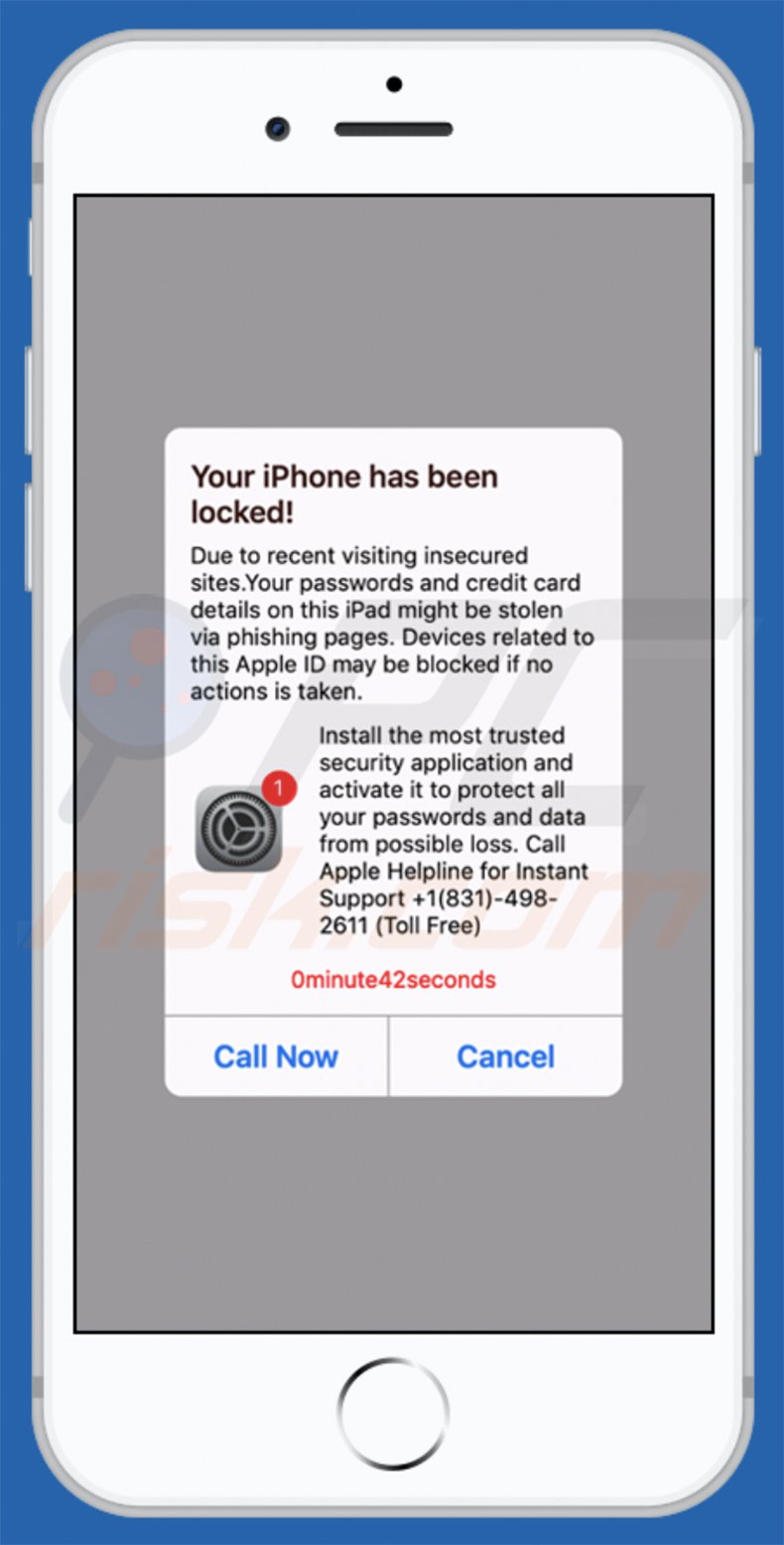
Text presented within:
Your iPhone has been locked!
Due to recent visiting insecured sites.Your passwords and credit card details on this iPad might be stolen via phishing pages. Devices related to this Apple ID may be blocked if no actions is taken.Install the most trusted security application and activate it to protect all your passwords and data from possible loss. Call Apple Helpline for Instant Support +1(831)-498-2611 (Toll Free)
0minute42seconds
Call Now Cancel
Instant automatic malware removal:
Manual threat removal might be a lengthy and complicated process that requires advanced IT skills. Combo Cleaner is a professional automatic malware removal tool that is recommended to get rid of malware. Download it by clicking the button below:
DOWNLOAD Combo CleanerBy downloading any software listed on this website you agree to our Privacy Policy and Terms of Use. To use full-featured product, you have to purchase a license for Combo Cleaner. 7 days free trial available. Combo Cleaner is owned and operated by RCS LT, the parent company of PCRisk.com.
Quick menu:
- What is "iPhone has been locked" virus?
- How to identify a pop-up scam?
- How do pop-up scams work?
- How to remove fake pop-ups?
- How to prevent fake pop-ups?
- What to do if you fell for a pop-up scam?
How to identify a pop-up scam?
Pop-up windows with various fake messages are a common type of lures cybercriminals use. They collect sensitive personal data, trick Internet users into calling fake tech support numbers, subscribe to useless online services, invest in shady cryptocurrency schemes, etc.
While in the majority of cases these pop-ups don't infect users' devices with malware, they can cause direct monetary loss or could result in identity theft.
Cybercriminals strive to create their rogue pop-up windows to look trustworthy, however, scams typically have the following characteristics:
- Spelling mistakes and non-professional images - Closely inspect the information displayed in a pop-up. Spelling mistakes and unprofessional images could be a sign of a scam.
- Sense of urgency - Countdown timer with a couple of minutes on it, asking you to enter your personal information or subscribe to some online service.
- Statements that you won something - If you haven't participated in a lottery, online competition, etc., and you see a pop-up window stating that you won.
- Computer or mobile device scan - A pop-up window that scans your device and informs of detected issues - is undoubtedly a scam; webpages cannot perform such actions.
- Exclusivity - Pop-up windows stating that only you are given secret access to a financial scheme that can quickly make you rich.
Example of a pop-up scam:

How do pop-up scams work?
Cybercriminals and deceptive marketers usually use various advertising networks, search engine poisoning techniques, and shady websites to generate traffic to their pop-ups. Users land on their online lures after clicking on fake download buttons, using a torrent website, or simply clicking on an Internet search engine result.
Based on users' location and device information, they are presented with a scam pop-up. Lures presented in such pop-ups range from get-rich-quick schemes to fake virus scans.
How to remove fake pop-ups?
In most cases, pop-up scams do not infect users' devices with malware. If you encountered a scam pop-up, simply closing it should be enough. In some cases scam, pop-ups may be hard to close; in such cases - close your Internet browser and restart it.
In extremely rare cases, you might need to reset your Internet browser. For this, use our instructions explaining how to reset Internet browser settings.
How to prevent fake pop-ups?
To prevent seeing pop-up scams, you should visit only reputable websites. Torrent, Crack, free online movie streaming, YouTube video download, and other websites of similar reputation commonly redirect Internet users to pop-up scams.
To minimize the risk of encountering pop-up scams, you should keep your Internet browsers up-to-date and use reputable anti-malware application. For this purpose, we recommend Combo Cleaner Antivirus for Windows.
What to do if you fell for a pop-up scam?
This depends on the type of scam that you fell for. Most commonly, pop-up scams try to trick users into sending money, giving away personal information, or giving access to one's device.
- If you sent money to scammers: You should contact your financial institution and explain that you were scammed. If informed promptly, there's a chance to get your money back.
- If you gave away your personal information: You should change your passwords and enable two-factor authentication in all online services that you use. Visit Federal Trade Commission to report identity theft and get personalized recovery steps.
- If you let scammers connect to your device: You should scan your computer with reputable anti-malware (we recommend Combo Cleaner Antivirus for Windows) - cyber criminals could have planted trojans, keyloggers, and other malware, don't use your computer until removing possible threats.
- Help other Internet users: report Internet scams to Federal Trade Commission.
Frequently Asked Questions (FAQ)
What is a pop-up scam?
Pop-up scams are deceptive messages designed to trick users into performing specific actions. Victims can be deceived into calling fake support lines, allowing cyber criminals to remotely access devices, transferring money, disclosing private data, downloading/installing software, purchasing products, subscribing to services, and so on.
What is the purpose of a pop-up scam?
Pop-up scams are designed to generate revenue. Cyber criminals primarily profit by obtaining funds through deception, abusing or selling sensitive information, promoting content, or proliferating malware.
Why do I encounter fake pop-ups?
Pop-up scams are run on deceptive websites that are seldom accessed intentionally. Most enter them via redirects caused by sites using rogue advertising networks, misspelled URLs, spam browser notifications, intrusive ads, or installed adware.
I cannot exit a scam page, how do I close it?
End the browser's process using the Activity Monitor. However, note that when you open the browser - you must not restore the previous browsing session since that will reopen the scam page.
I have allowed cyber criminals to remotely access my computer, what should I do?
First, you must disconnect the device from the Internet. Second, uninstall the remote access software that the cyber criminals used (e.g., TeamViewer, UltraViewer, etc.). Lastly, run a full system scan with an anti-virus and eliminate all detected threats.
I have provided my personal information when tricked by a pop-up scam, what should I do?
If you have disclosed log-in credentials - change the passwords of all potentially exposed accounts and inform their official support without delay. And if you've provided other private data (e.g., ID card details, passport scans/photos, credit card numbers, etc.) - immediately contact the appropriate authorities.
Will Combo Cleaner protect me from pop-up scams and the malware they proliferate?
Combo Cleaner is designed to scan visited websites and issue alerts if they are detected as rogue, deceptive (scam), or malicious. Therefore, should you enter such a page - you will be warned immediately, and further access will be restricted. Furthermore, Combo Cleaner is capable of detecting and eliminating practically all known malware infections. However, since high-end malicious software usually hides deep within systems - performing a full system scan is paramount.
Share:

Tomas Meskauskas
Expert security researcher, professional malware analyst
I am passionate about computer security and technology. I have an experience of over 10 years working in various companies related to computer technical issue solving and Internet security. I have been working as an author and editor for pcrisk.com since 2010. Follow me on Twitter and LinkedIn to stay informed about the latest online security threats.
PCrisk security portal is brought by a company RCS LT.
Joined forces of security researchers help educate computer users about the latest online security threats. More information about the company RCS LT.
Our malware removal guides are free. However, if you want to support us you can send us a donation.
DonatePCrisk security portal is brought by a company RCS LT.
Joined forces of security researchers help educate computer users about the latest online security threats. More information about the company RCS LT.
Our malware removal guides are free. However, if you want to support us you can send us a donation.
Donate
▼ Show Discussion